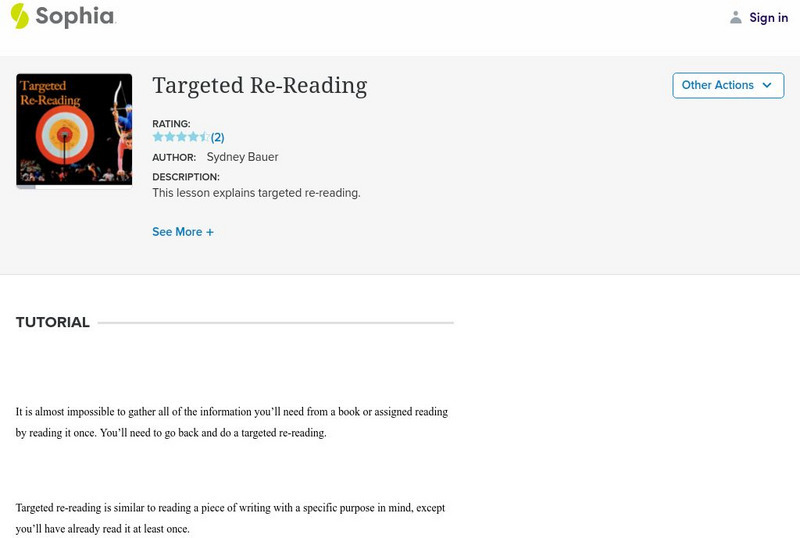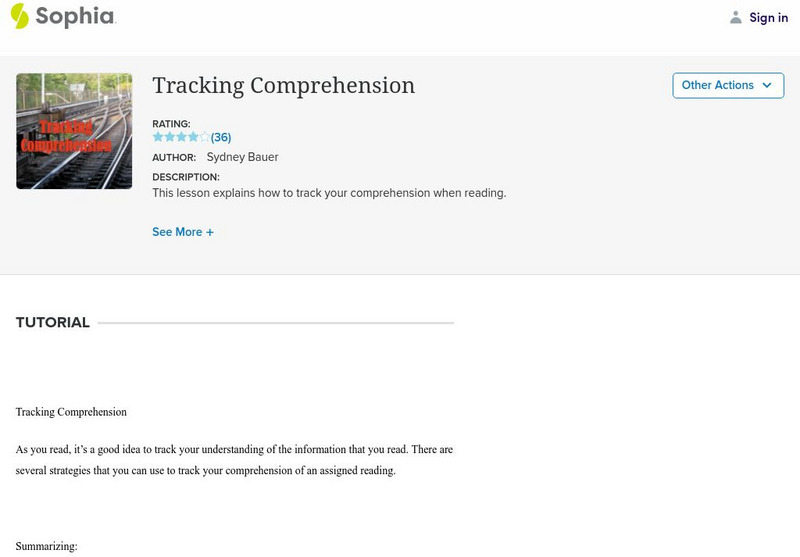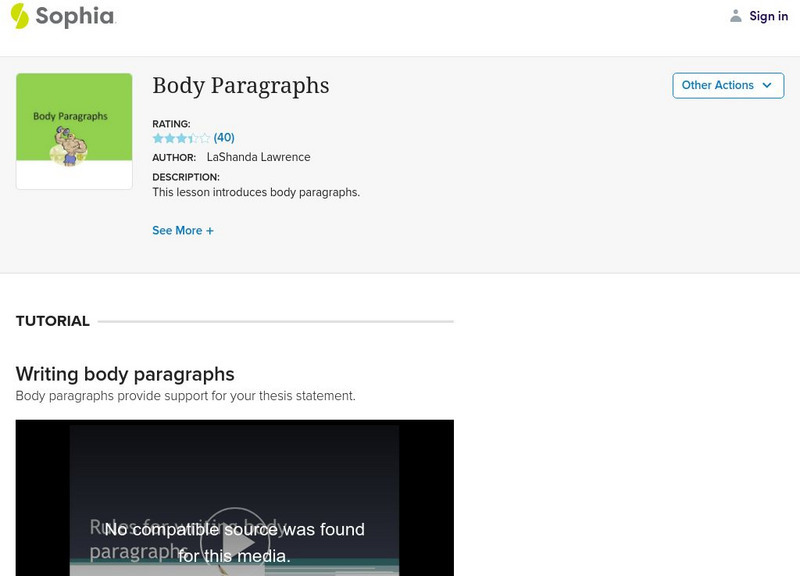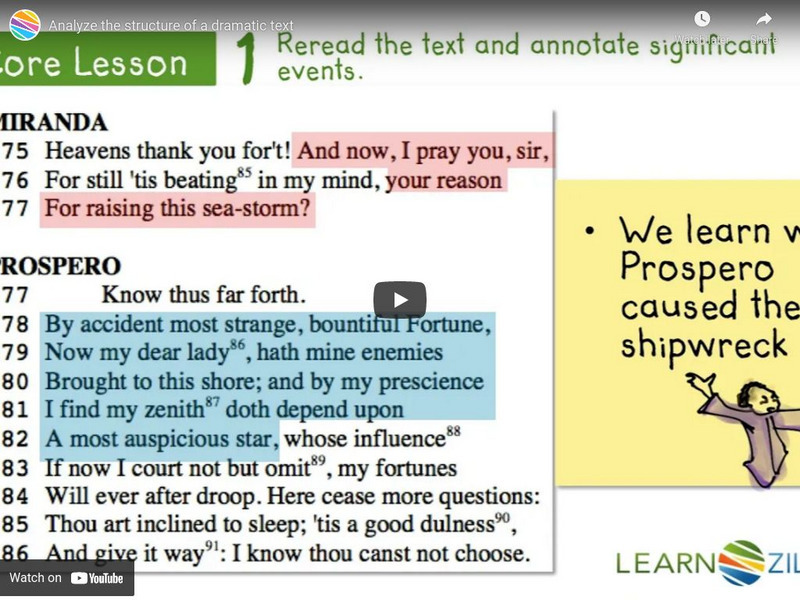Hi, what do you want to do?
TED-Ed
Could We Actually Live on Mars?
What would be the best place to live on Mars? A fascinating look at the geographical of Mars is sure to intrigue the future astronomers in your middle or high school class. A short video introduces learners to the different...
Curated OER
How Social Media Can Make History
From Nineteen Eighty-Four, Brave New World, and Fahrenheit 451 to Facebook, Twitter, and TXT. Here’s a must-see video for anyone interested in the transformation of the media landscape and message distribution. The narrator traces four...
PBS
Top 4 Tips to Spot Bad Science Reporting
How can people make good decisions about their health when modern news reporting is so unreliable? Using an informative video resource, viewers discover the acronym GLAD. They learn to get past the clickbait, look for crazy claims,...
PBS
Why Do Our Brains Love Fake News?
Fake news is all about the dorsolateral prefrontal cortex versus the orbitofrontal cortex. Huh? Get the facts, the real deal, with a short video that explains clearly and succinctly what's going on in our brains that leads us to listen...
PBS
Invisible Man: Plot Summary
Although labeled as a plot summary, this resource from the American Masters series is so much more. In addition to clips from the American Masters film, the packet contains teaching tips, discussion questions, a background reading, and...
PBS
Documenting the Dust Bowl
Paul Taylor's interviews and Dorothea Lange's photographs bring to life the unimaginable devastation of the Dust Bowl. After watching a short video from PBS, viewers are asked to imagine how they would react, whether they would stay or...
PBS
All-Female Enterprise
Watch as a group of Palestinian widows who found themselves in a desperate situation with little education and few resources turn their lives around by creating an all female cooperative business enterprise.
Cambridge University
How Sherpas Have Evolved "Superhuman" Energy Efficiency
Why are Sherpas so uniquely equipped to guide aspiring mountain climbers up Mount Everest? Learn all about the biological ways that Sherpas can survive in a low-oxygen environment with an informative video.
PBS
The Pilgrims: European Plague in Native New England, 1616-1619
Before the Pilgrims' arrival to New England, a vicious plague swept across New England and wiped out over 50% of the Native American people from Maine to Massachusetts. Watch a video that examines this devastation and the role it played...
PBS
The Pilgrims: Mayflower Compact
What was the Mayflower Compact? Watch a video that explains the purpose of coming to New England on the Mayflower and the social compact that bound the Pilgrims to the government and laws that would be created in the new land.
TED-Ed
Can You Solve the Pirate Riddle?
Yo Ho Ho! Landlubbers, seadogs, and scallywags are sure to treasure a video that presents them with the challenge of the pirate riddle. Heave ho! Hornswagglers beware!
TED-Ed
How a Few Scientists Transformed the Way We Think About Disease
During the first few sniffles of a cold, you can't help wondering where you picked up the illness. Watch an Ed Ted video that details the difference between miasma theory and germ theory, and the ways that Dr. John Snow's research...
TED-Ed
Why is Bread Fluffy, Vinegar Sour, and Swiss Cheese Holey?
The gourmands and foodies in your class will love this gastronomical video! Educational and entertaining, the video explains the natural and added microorganisms that occur with food production, including yeast in bread, carbonation in...
TED-Ed
The race to sequence the human genome
The world of genetics and DNA is much clearer than it was 25 years ago, in large part due to the success of the Human Genome Project. Watch a short, engaging video about the dueling organizations who raced to be the first to sequence the...
TED-Ed
How does anesthesia work?
Many people know the feeling of counting backward from 100 before a surgical procedure begins, but what actually happens between number 99 and waking up after surgery? Watch a short video about the different types of anesthesia, the...
TED-Ed
How Optical Illusions Trick Your Brain
What have our eyes and brains evolved to see? Discover the way our photo receptors and brains assemble visual information into the three-dimensional world we see around us.
The New York Times
Kiev in Chaos: Teaching About the Crisis in Ukraine
Provide a historical context for the political unrest between Russia and Ukraine that began in late 2013. Learners review their prior knowledge and chronicle new understandings with a KWL chart, watch a video explaining the Ukrainian...
TED-Ed
The Key to the Media's Hidden Codes
You are being manipulated! Arm yourself with awareness! Learn how to identify the various technical codes (images, sounds, colors), and how media makers use these codes to subconsciously influence your emotions and impulses. Just do...
Sophia Learning
Sophia: Targeted Re Reading
This lesson defines and explains how to do targeted re-reading and provides two literary examples. It offers this information in both text and audio formats.
Sophia Learning
Sophia: Tracking Comprehension
This lesson focuses on strategies for tracking comprehension while reading. It provides three main strategies: summarizing, chunking, and glossing. It explains each in step-by-step fashion using both text and audio.
PBS
Pbs Learning Media: Objectifying the Text: Conversations in Literature
See how effective readers utilize literary elements and allusions to critically analyze a text in this one-hour video Objectifying the Text. A group of nine experienced educators examine the process of envisionment building as they...
Sophia Learning
Sophia: Body Paragraphs
This lesson introduces body paragraphs. [3:41] CCSS.ELA-Literacy.WHST.6-8.2.b
Annenberg Foundation
Annenberg Learner: Conversations in Literature
A series of 8 instructional videos, each about 60 minutes in length, designed to model effective reading habits through envisionment building. Topics include Responding As Readers, Envisioning, Stepping In, Moving Through, Rethinking,...
Imagine Learning Classroom
Learn Zillion: Lesson Video for 'Analyze the Structure of a Dramatic Text'
In this lesson, you will learn how to analyze the structure of a dramatic text by creating a timeline of events. [6:15]




























